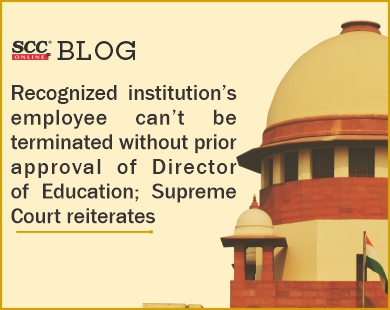Supreme Court: In an appeal filed by an employee of Adarsh Siksha Parishad Samiti against the judgment and order passed by the Rajasthan High Court, wherein the Court has set aside the order passed by the Single Judge and the Tribunal quashing and setting aside the termination order dated 06-08-1998, the division bench of MR Shah*and CT Ravikumar, JJ. held that on true interpretation of Section 18 of the Rajasthan Non-Governmental Educational Institutions Act, 1989 (‘the Act, 1989'), even in case of termination/removal of an employee of a recognized institution after holding departmental enquiry/proceedings, prior approval of the Director of Education must be obtained as per first proviso to Section 18 of the Act, 1989.
In the case at hand, a disciplinary enquiry was initiated against the employee under provisions of the the Act, 1989. On conclusion of the departmental enquiry services of the employee came to be terminated, which was the subject matter of challenge before the Tribunal. The Tribunal set aside the order of termination by holding that the prior approval of the Director of Education as mandatory under Section 18 of the Act, 1989 was not obtained. The Single Judge confirmed the order passed by the Tribunal.
The Court relied on Raj Kumar v. Director of Education, (2016) 6 SCC 541, wherein the Court had viewed that “before termination of an employee, prior approval of the Director of Education is mandatory and required” and said that the High Court has not followed the said decision by erroneously observing that in the case of Raj Kumar (supra), the earlier decision in the case of T.M.A. Pai Foundation v. State of Karnataka, (2002) 8 SCC 481 was not considered. Thereafter, the High Court relied on larger bench decision in Central Academy Society v. Rajasthan Non-Government Educational Institutions Tribunal, 2010 SCC OnLine Raj 2382 and read down Section 18 of the Act, 1989, further observed that in case of a termination after the disciplinary enquiry/proceedings prior approval of the Director of Education is not required.
The Court said that if the decision in the case of Raj Kumar (supra) is seen, in more than 8-9 paragraphs, this Court had referred to and as such dealt with the decision in T.M.A. Pai Foundation (supra). Therefore, the High Court is factually incorrect in observing that while deciding the decision in the case of Raj Kumar (supra), this Court had not considered the decision of this Court in the case of T.M.A. Pai Foundation (supra). Before commenting upon the decision of this Court in the case of Raj Kumar (supra) the Division Bench of the High Court ought to have thoroughly read and/or considered the decision in the case of Raj Kumar (supra).
The Court further said that the High Court has itself considered a few decisions of judicial discipline which were not applicable at all. Judicial discipline requires that the judgment of Supreme Court should be considered and read thoroughly. It also said that as the decision in Raj Kumar (supra) was binding upon the High Court. Therefore, the High Court has seriously erred in not following the decision of this Court in the case of Raj Kumar (supra).
The Court took note of Section 18 of the Act, 1989 and opined that in Section 18, there is no distinction between the termination, removal, or reduction in rank after the disciplinary proceedings/enquiry or even without disciplinary proceedings/enquiry. As per the settled position of law the provisions of the statute are to be read as they are. Nothing to be added and or taken away.
The Court said that the words used are “no employee of a recognised institution shall be removed without holding any enquiry and it further provides that no final order in this regard shall be passed unless prior approval of the Director of Education has been obtained.” The first part of Section 18 is to be read along with the first proviso. Thus, it held that in case of dismissal/removal of an employee of a recognised institution which is after holding the departmental enquiry, the prior approval of the Director of Education is not required is unsustainable and to that extent the judgment in the case of Central Academy Society (supra) is not a good law.
Thus, the Court set aside the impugned judgment and restored the orders of the Tribunal and Single Judge. Further, it said that the employee shall have to be reinstated in service but considering that the order of termination was passed as far as back in the year 1998, directed that the employee shall be entitled to 50% of the back wages.
[Gajanand Sharma v. Adarsh Siksha Parisad Samiti, 2023 SCC OnLine SC 54, decided on 19-01-2023]
*Judgment by: Justice MR Shah
*Apoorva Goel, Editorial Assistant has reported this brief.







